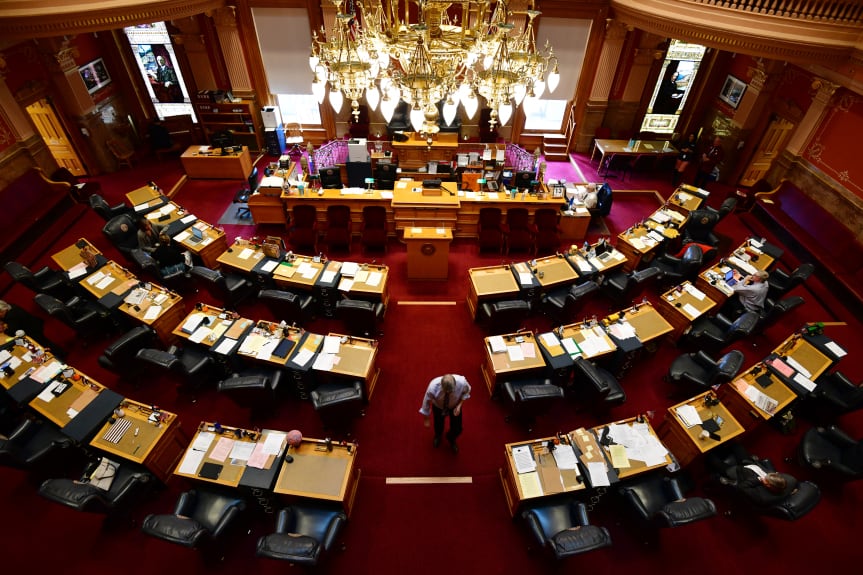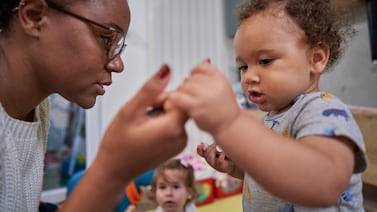A bill headed to the Colorado governor’s desk bans handcuffing students in most circumstances, requires schools to notify parents promptly when they restrain students, and sets higher standards for school resource officers.
The bill also requires school districts to report publicly much more information about student discipline, tickets, and arrests, and to break down the numbers by race, ethnicity, disability, and other student characteristics. The Colorado Department of Education will have to make that data and other information about school climate available online.
“This is a game-changing first step in making sure we know what experiences our students are having in school, including restraints, including discipline,” said Krista Spurgin, executive director of Stand for Children, a supporter of the bill. “There is work ahead of us, but the data we’re collecting here will give us a transparent view of how we need to support our schools and our teachers and our students differently.”
School district officials and special education directors strongly opposed the bill’s data reporting requirements as overly burdensome and unrealistic, while many Republicans raised concerns about student data privacy.
Amendments to the bill laid out privacy protections, many of which are already common practices of the state education department, and eliminated a requirement that districts report all instances of seclusion and restraint that last longer than one minute to the state education department.
Instead, a working group will develop rules for when seclusion and restraint need to be reported and how. Bret Miles, executive director of the Colorado Association of School Executives, said it’s critical for districts to participate in shaping those requirements.
“This impacts how we handle some of the toughest kids,” he said.
Introduced late in the session, House Bill 1376 passed its final legislative hurdle Wednesday, the last day of the 2022 Colorado General Assembly. A year ago, sponsors withdrew a much more expansive school discipline reform effort in the face of fierce opposition.
House Bill 1376 aims to create more supportive school environments for students by shedding more light on disciplinary practices and how they affect students of color, those from low-income families, and those with disabilities, and by encouraging better approaches. The bill was sponsored by Democrats state Reps. Mary Young of Greeley and Leslie Herod of Denver, and state Sen. Faith Winter of Westminster, as well as Republican state Sen. Kevin Priola of Henderson.
The bill calls on the state’s police oversight board to adopt best practices for school resource officers and only assign officers who want to work with youth in school settings. School leaders will have a greater role in evaluating the performance of these officers.
The more controversial aspects of the bill deal with seclusion, which means shutting a student in a room, and restraint, which the law defines as putting a student in a physical hold for more than five minutes. School districts say these methods are used only as a last resort and to protect student and teacher safety.
Advocates for students with disabilities, who are far more likely than their peers to experience seclusion and restraint, say these interventions often traumatize children and worsen challenging behavior. They want educators to be better trained in de-escalation techniques to head off behaviors in the first place.
A 2017 law already bans dangerous prone restraints and requires school districts to conduct annual reviews of their use of seclusion and restraint.
But they don’t have to post that information publicly or share it with the Colorado Department of Education.
A Chalkbeat investigation found wide variations in how school districts tracked and reported this information. Because districts don’t have to submit their annual reviews to any government agency, there is little oversight.
And until now, when state regulators have identified violations, they haven’t had the authority to order corrective action.
In a key change, the bill gives the state education department enforcement authority to change district practices when they harm students.
Also, students cannot be handcuffed at school unless they pose an immediate danger to themselves or others or are being placed under arrest. Seclusion rooms will have to have a window or the ability to monitor children by video to make sure they don’t hurt themselves while they’re alone.
And schools will now have to notify parents of any restraints lasting longer than one minute and how many times a student is restrained in one day. Advocates told lawmakers parents sometimes only learn their child was placed in a hold when they see bruises.
Spurgin said advocates need to participate in the rule-making process for data reporting to ensure the bill produces meaningful information about student discipline and racial and other disparities.
The State Board of Education places a premium on student privacy and redacts significant information from large data sets to ensure no one could work backwards to infer, for example, that two Black students in a mostly white school have been suspended. The result can be fields of blank squares where numbers should be.
Spurgin said she believes privacy can be balanced with producing data that schools and communities can act on to get more money, training, and mental health support for Colorado schools.
“At the very least, we’ll have a clearer idea of what those experiences [with discipline and arrest] are looking like for students across race, ethnicity, disability and gender,” she said. “And then we need to look at what resources and training we can give our schools to create a better climate for our students.”
Bureau Chief Erica Meltzer covers education policy and politics and oversees Chalkbeat Colorado’s education coverage. Contact Erica at emeltzer@chalkbeat.org.






